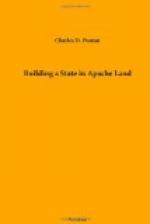The winter was mild and charming, very little snow, and only frost enough to purify the atmosphere. It would be difficult to find in any country of the world, so near the sea, such prolific valleys fenced in by mountains teeming with minerals. The natural elements of prosperity seem concentrated in profusion seldom found. In our primitive simplicity we reasoned that if we could take ores from the mountains and reduce them to gold and silver with which to pay for labor and purchase the productions of the valleys, a community could be established in the country independent of foreign resources. The result will show the success or failure of this Utopian scheme.
The usual routine at Tubac, in addition to the regular business of distributing supplies to the mining camps, was chocolate or strong coffee the first thing in the morning, breakfast at sunrise, dinner at noon, and supper at sunset.
Sunday was the day of days at Tubac, as the superintendents came in from the mining camps to spend the day and take dinner, returning in the afternoon. One Sunday we had a fat wild turkey weighing about twenty-five pounds, and one of my engineers asked permission to assist in the cocina. It was done to a charm, and stuffed with pine nuts, which gave it a fine flavor.
As we had plenty of horses and saddles, a gallop to the old Mission of San Jose de Turnucacori, one league south on the Santa Cruz River, afforded exercise and diversion for the ladies, especially of a Sunday afternoon. The old mission was rapidly going to ruin, but the records showed that it formerly supported a population of 3,500 people, from cultivation of the rich lands in the valley, grazing cattle, and working the silver mines. The Santa Cruz valley had been and could apparently again be made an earthly paradise. Many fruit trees yet remained in the gardens of the old mission church, and the “Campo Santo” walls were in a perfect state of preservation.
The communal system of the Latin races was well adapted to this country of oases and detached valleys. Caesar knew nearly as much about the governing machine as the sachem of Tammany Hall, or a governor in Mexico. At least, he enriched himself. In countries requiring irrigation the communal system of distributing water has been found to produce the greatest good for the greatest number. The plan of a government granting water to corporations, to be sold as a monopoly, is an atrocity against nature; and no deserving people will for long submit to it. The question will soon come up whether the government has any more right to sell the water than the air.
In the spring of 1857, a garden containing about two acres was prepared at Tubac, and irrigated by a canal from the Santa Cruz River. By the industry of a German gardener with two Mexican assistants, we soon produced all vegetables, melons, etc., that we required, and many a weary traveler remembers, or ought to remember, the hospitalities of Tubac. We were never a week without some company, and sometimes had more than we required; but nobody was ever charged anything for entertainment, horse-shoeing, and fresh supplies for the road. Hospitality is a savage virtue, and disappears with civilization.




